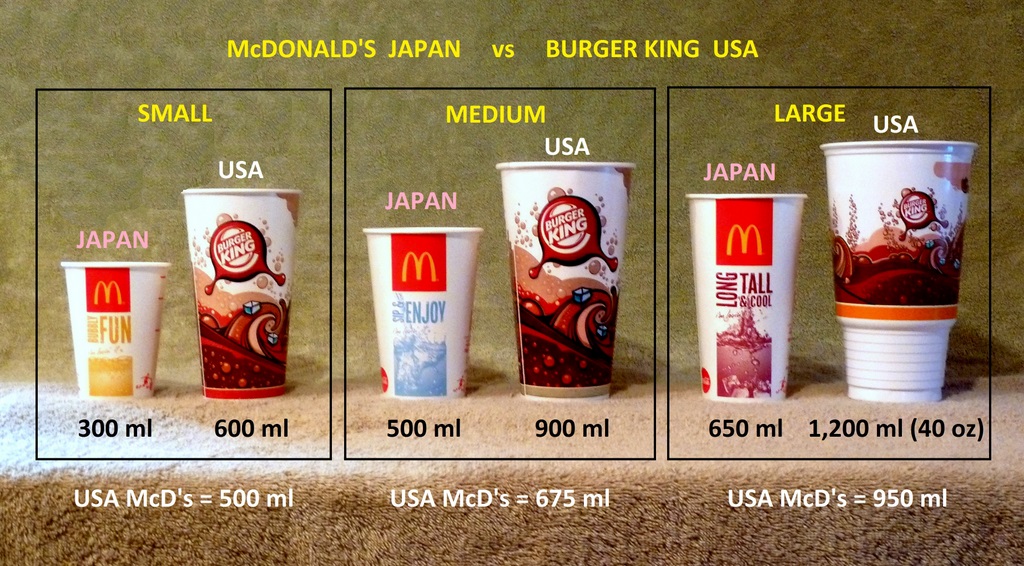You may have heard that everything in Japan is more expensive compared to the United States, but perhaps we’re a little too generous instead. A series of photos has surfaced that compare the numerous fast food softdrink cups from Japan and the US. While the two countries share the three basic sizes (Small, Medium and Large), the differences between the equivalents are quite stark.
It’s no surprise that Americans have been crowned the country with the most obese people in the developed world. Approximately 65% of the population is considered either overweight or obese, with a steady rise the past three decades. With around 300,000 deaths a year attributed directly to obesity, it’s truly the silent killer.
At a fast food restaurant, an adult is naturally inclined to skip the small and maybe medium cups, since they consider themselves as grown ups. When you’re not clearly shown how big these cups are, you might end up with a big drink that you didn’t need. If you start to repeat the same mistake and order a large every time, then it’s time to assert some self control.
It can be a little difficult when restaurants like McDonald’s starts to tug your frugal heartstrings by offering any soft drink size at $1 — it’s important to remember that this is a campaign to train you to want more, even after the prices hike back up!

“Americans have been crowned the country with the most obese people in the developed world”
That statement is true, but misleading.
Sure, we have a lot of fatties, but we also have a lot of people in general. At over 317 million people (not even counting illegal aliens and other people that aren’t on the books), the United States is the third largest country in the world. 32% of the population is obese. Mexico is smaller (118 million), but 32.8% of their population is obese. They’re currently the fattest. Even Canada (the country that everyone these days seems to compare us to like they’re our more successful sibling) is sitting at around 23%.
And of course, using the qualifier “developed” also makes things seem worse than they are. You think 32% obesity is bad? How about Nauru’s 71.7%, with 94.5% overweight? I get why the distinction is made (many people in developing countries are either fat because they can’t afford health care/education or healthier food, or they’re starving to death) but it isn’t right to rule them ALL out just because they technically qualify as developing. Most of the world is developing, but that doesn’t mean they’re all poor and starving. In Nauru’s case, it’s because they actually had it TOO good: they got fat and lazy because the government redistributed the profits of some mining operations. They didn’t need to work anymore, so they didn’t, and started importing fatty food from Australia and New Zealand.
Late to reply, but…
Interesting points! And I do recall some Arab nations having more obese people than the U.S. since they’re reaping so much comfort from their oil reserves. The rankings are quite volatile.
I didn’t find drinks exactly cheap in Japan. I don’t drink beer, but I heard one bar in Fukuoka sold a glass of it for ¥980.
Nope, not cheap at all! Some places have cheap beers at around $1 a mug during happy hour, but look closely and it’s not even beer — it’s happoshu. It’s similar to beer, but with lower malt content, legally not classified or marketed as beer, and in return isn’t taxed as heavily.
It’s still very beer-like, and it can be less bitter. This has actually created new fans, with some women preferring it to beer (some men however still prefer beer, even with its price disadvantage — maybe just out of principle).
Recently the tax went up for happoshu, so now they have a new category nicknamed “the third beer.” It’s pretty fascinating the lengths they’ll go to preserve the tradition of beer, or at least its social and price aspects.
happoshu? I should try that.